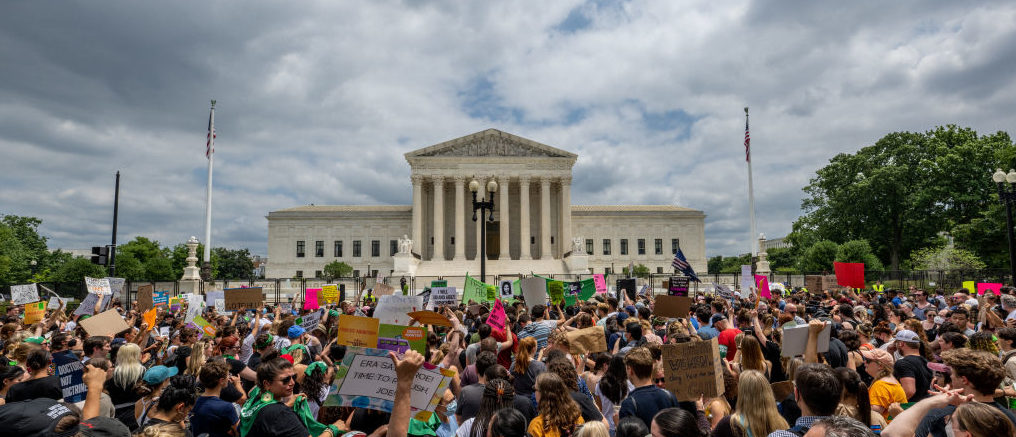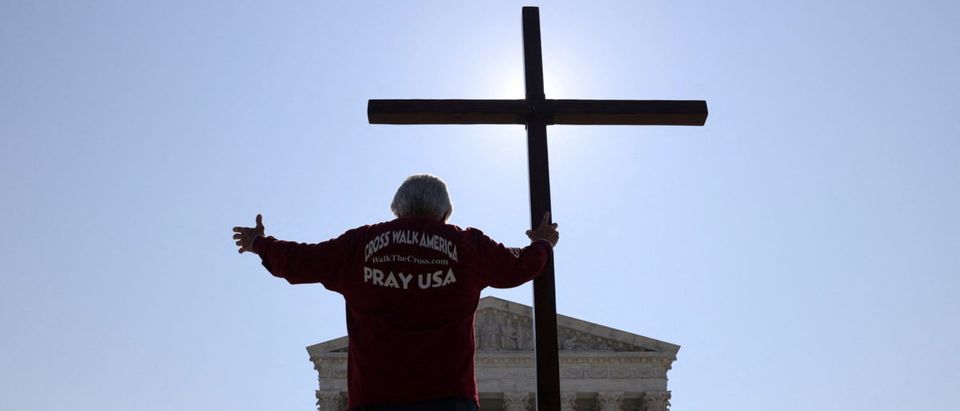- Last year, major religious liberty cases were decided regarding school prayer and public funding of religious schools, and 2023 could see a similar pattern with several cases coming up that could set important precedents for religious freedom.
- Battles over religious rights in schools, the medical field and the workplace are likely hot spots of debate for the upcoming year, according to lawyers.
- “If they can say ‘well you can have your religious freedom but you can’t make a living, we’re not going to allow you to feed your children’ [then] you don’t have religious freedom,” Kelly Shackelford, president and CEO of First Liberty Institute told the Daily Caller News Foundation.
Religious liberty will be a hot-button issue in American courts in 2023, with several cases in particular that could set important precedent for the rights of religious Americans in the future, according to lawyers who spoke with the Daily Caller News Foundation.
Due to Supreme Court cases like Kennedy v. Bremerton High School, regarding education employees’ rights to pray at school, or Carson v. Makin, where the court ruled that public funding could be used for students attending religious schools, religious freedom was often at the center of debate last year. While debates regarding religious freedom and its limits are nothing new, several upcoming legal battles are posed to restructure the debate regarding religious rights at school, in the workplace and in the medical field, the attorneys said.
“If you have a sort of totalitarian regime come in the one thing it can never allow is the citizens to hold an allegiance to one higher than the government,” Kelly Shackelford, president and CEO of First Liberty Institute (FLI), told the DCNF. “So whenever that type of oppression comes in it tends to be that the first flashpoint is almost always a religious freedom issue and if you lose there that’s just a beginning of the dominoes that are going to fall.”
The Supreme Court’s overturning of Roe v. Wade in 2022 sparked conflicts with religious medical professionals after many workplaces decided to offer abortion or contraceptive services, often without the possibility of religious exemption, according to First Liberty Institute. Shackelford told DCNF that abortion-related issues were the highest growth area for religious liberty lawsuits.
“I think you’re going to see a ton of these, ’cause we are seeing a ton of these,” Shackelford noted. (RELATED: POLL: Most Americans Can’t Name Freedom Of Religion As A First Amendment Right)
FLI filed a lawsuit against the Department of Veterans Affairs last month on behalf of nurse Stephanie Carter after the VA announced that it would be performing abortions. Carter works at a VA facility in Texas, a state where abortions are banned; when Carter attempted to receive a religious exemption for performing abortions she was told to wait and that the VA did not have a religious exemption available at the time.
The VA told the DCNF that there was a religious exemption VA employees could fill out.
“From day one, Secretary McDonough has made clear to all employees that their religious beliefs are protected here at VA,” Terrence Hayes, the VA press secretary, stated. “VA continues to provide accommodations for VA employees who wish to opt out of providing abortion counseling or services.”
In the lawsuit, FLI argues that the VA’s mandate puts Carter at odds with both her job and state law because if she were to refuse to perform an abortion her job could be at risk, and if she were to perform an abortion she could face a felony charge from the state of Texas. Shackelford told the DCNF that the workplace is the “emerging area” where you are going to see more religious discrimination due to corporate America’s embrace of “wokeism,” and pointed to an older case predating the Dobbs decision involving CVS.
FLI also filed a lawsuit on Jan. 11 against CVS Health Corporation after it removed its religious exemption in 2021 for prescribing contraceptives. Robyn Strader, a nurse practitioner, was fired from her job after the company rescinded her religious exemption and attempted to force her to prescribe contraceptives that she believes “could prevent the implantation of an embryo, otherwise cause an abortion, or contribute to infertility.”
Shackelford stated that cases like Carter and Strader’s were important because “[i]f you don’t have religious freedom in the workplace” then you don’t have it at all.
“There is no religious freedom if you only have it if you are willing to give up your paycheck,” Shackelford said. “If they can say ‘well you can have your religious freedom but you can’t make a living, we’re not going to allow you to feed your children,’ [then] you don’t have religious freedom.”

WASHINGTON, DC – JUNE 24: People protest in response to the Dobbs v Jackson Women’s Health Organization ruling in front of the U.S. Supreme Court on June 24, 2022, in Washington, DC. (Photo by Brandon Bell/Getty Images)
Schools are another area religious liberty cases have been at the forefront. Sacred Heart of Jesus Parish (SHJP) filed a lawsuit against the Michigan Civil Rights Commission and Michigan Attorney General Dana Nessel in December after the state Supreme Court ruled that the Michigan Civil Rights Act included a prohibition on discrimination on sexual orientation and gender identity. The decision prevents religious schools like SHJP from choosing not to hire individuals who do not agree with traditional Catholic views on issues such as same-sex marriage and sexual orientation.
Ryan Tucker, ADF senior counsel, told the DCNF that the Michigan Supreme Court’s ruling could lead to many religious schools being unable to provide an education that is in line with their faith.
“Under Michigan’s new interpretation of its nondiscrimination law, ‘sex’ has been redefined to include sexual orientation and gender identity,” Tucker said. “This directly impacts our clients’ ability to provide a Catholic education to kids in the community. Private religious schools like Sacred Heart Academy should have the right to operate according to their faith.”
Another example of this can be found in higher education at schools like Yeshiva University (YU). The Jewish school has been the subject of a lawsuit filed by the LGBTQ YU Pride Alliance student group after the school choose not to officially recognize the group on campus due to conflicting views regarding the LGBTQ community.
In a petition filed with the Supreme Court last year, Yeshiva argued that allowing the group to become an official student chapter on campus would directly conflict with the school’s “sincere religious beliefs” regarding its instruction of Torah values. The Supreme Court, however, ruled that it did not currently have jurisdiction over the case and that Yeshiva must return its appeal to the New York Court of Appeals.
In the appeal, Yeshiva argued that if the appeals court ruled in favor of YU Pride Alliance the result would “potentially subjects all religious institutions of higher education to endless, crippling litigation.” Despite this, the appeals court promptly ruled against Yeshiva and ordered them to recognize the LGBTQ group.
A Yeshiva spokesperson told the DNCF after the decision that the university planned to appeal the court ruling and was “disappointed” that the court failed to recognize the Jewish school as a “religious institution.”
In December, the Supreme Court heard oral arguments for 303 Creative LLC v. Elenis, which raises the question of whether the government can compel an individual’s speech. The case involves Christian web designer Lorie Smith, who filed a lawsuit against Colorado’s Anti-Discrimination Act, forcing her to create websites for same-sex couples despite her religious objection to gay marriage.
Smith is being represented by Alliance Defending Freedom (ADF), which noted in the oral arguments that the case is about the right to freedom of speech for everyone, including religious business owners.
“The state forces Ms. Smith to create speech, not simply sell it,” Kristin Waggoner, ADF president and general counsel, stated during the arguments. “Next Colorado says it can compel speech on the same topic, but Ms. Smith believes opposite-sex marriage honors scripture and same-sex marriage contradicts it. If the government can label this speech equivalent it can do so for any speech whether religious or political.”
The Supreme Court is due to make a decision on the case this year and its ruling would set a precedent for whether state and federal governments can compel speech regardless of religious convictions.
CVS Health Corporation, Nessel, MCRC, YU Pride Alliance and the Colorado Civil Rights Division did not respond to the DCNF’s request for comment.
All content created by the Daily Caller News Foundation, an independent and nonpartisan newswire service, is available without charge to any legitimate news publisher that can provide a large audience. All republished articles must include our logo, our reporter’s byline and their DCNF affiliation. For any questions about our guidelines or partnering with us, please contact licensing@dailycallernewsfoundation.org.












